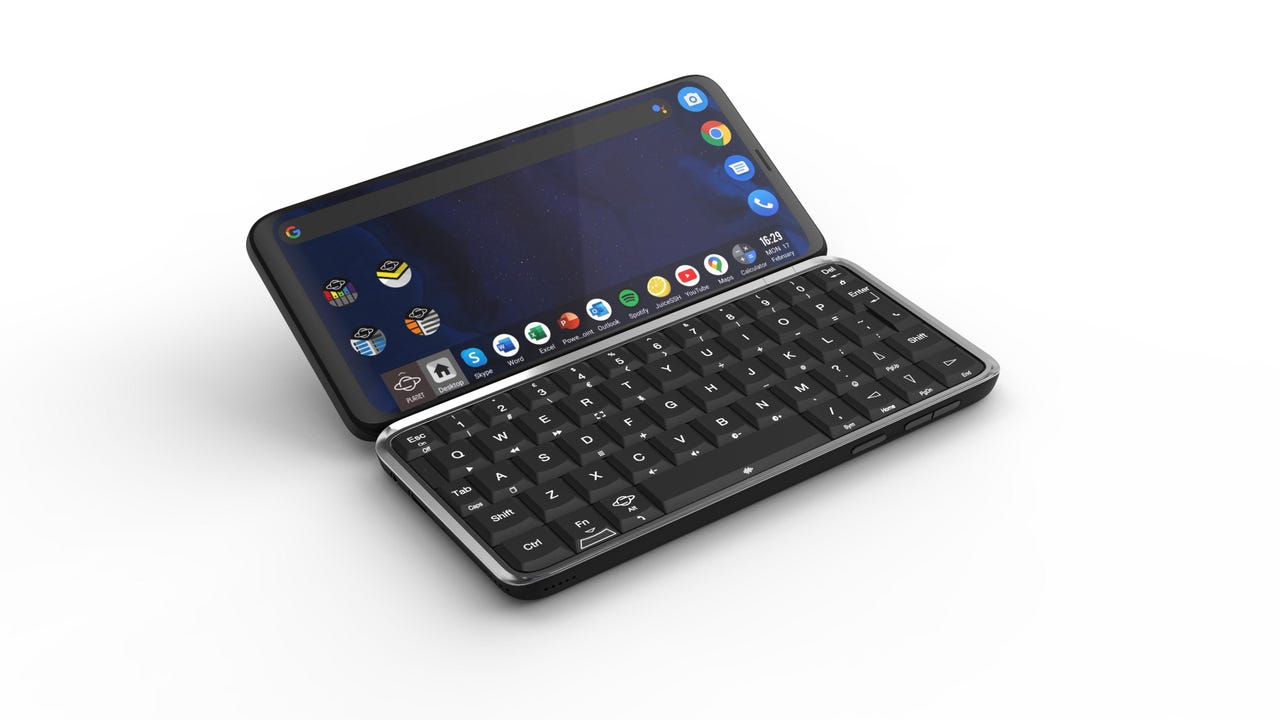With Astro Slide, Planet Computers goes all in on smartphones with sliding hinge and 5G


The Astro Slide is not a clamshell, but opens to the same 140° screen angle.
In 2018, Planet Computers released the Gemini, a product that imbued the clamshell palmtop of the 1990s with an operating system of the present day. The product's most noteworthy attribute was its best-in-class keyboard, a design similar to one of the Psion 5 computers -- no surprise since it was designed by the same designer who led that product. It was in some ways too faithful to the Psion PDAs of decades ago. As I mentioned in my column on the forthcoming Surface Duo, the "second pocket device" pitch is a tough sell. Planet followed up with added a small exterior screen to the shell of an updated device called the Cosmo Communicator. While more usable as a phone than the Gemini, it still required many compromises.
In announcing the third Planet, the company hopes to broaden its appeal to more mainstream Earthlings. With the help of a new "rock up slider" hinge, the Astro Slide offers what is best understood not as a PDA or Communicator, but simply a phone. When closed, the device looks like a smartphone from the top. However, the screen slides out and then at an angle to reveal a keyboard similar to the one on its first products. By having a full smartphone display on the outside, users gain easier one-handed operation, faster access to apps by removing the time to open a clamshell and accommodation of apps that obstinately insist on portrait orientation (although they will still want to use an orientation manager to rotate them when using the keyboard). The Astro Slide also includes a wider 6.5-inch display in part to accommodate the room needed for the rails that slide into the body of the product. The company says the device's footprint is similar to that of an iPhone 11 Pro Max.
When closed, the Astro Slide looks like a standard smartphone.
The Astro Slide's hinge mechanism behaves somewhat similarly to that of the F(x)Tec Pro1 that I wrote about in January, but does not obscure any of the lower deck as the F(x)Tec's does and appears to provide more stability when used on a surface. Indeed, Planet Computers' keyboards are optimized for surface use while the F(x)Tec Pro's is optimized for standing use. The tradeoff for the Astro Slide's larger keys is that some common keys, such as the period and comma, requires using a modifier key, a technique that was also long employed by Blackberry keyboards dealing with the limited width of a portrait-oriented phone. Planet CEO Janko Mrsic-Flogel says that the company has been successful in attracting many former Psion and Nokia Communicator users and is now gunning for users of the once wildly popular smartphone that may have seen its last model given the end of a brand license to TCL.
But as I also discussed in the Surface Duo column, stepping into the smartphone arena thrusts one into the arena of giants. It's unlikely, for example, that the Astro Slide will be able to go toe-to-toe with the best smartphone cameras for those seeking the ultimate photo and video quality. But particularly given that the device isn't scheduled to ship until early next year, Planet chose to make 5G an integrated component for its new device by using a high-end Mediatek Dimensity 1000 chipset as well as Wi-Fi 6. MediaTek doesn't currently support millimeter-wave networks, but Planet thinks supporting sub-6 GHz networks will be a good fit for its top two markets of Japan and the US. There will be no Wi-Fi-only configuration as was the case with the original Gemini, in part to simplify certifications. In any case, its front-facing display makes it much easier to adopt as an everyday smartphone. The product also sports a 48 MP rear camera, two USB-C ports and supports DisplayPort, two nanoSIM slots with eSIM, NFC, and wireless charging, a first for the Planet line.
The Astro Slide will run Android 10 with a Linux dual-boot option. Its Indiegogo campaign launches today with a backer price of $549 that is expected to rise to $899 when the device ships. Compared to the Cosmo, it is a millimeter thinner and a bit shorter in portrait orientation. Planet says its bill of materials is, on balance, a bit higher due to the 5G feature, but that it has also saved some costs such as the second screen on the Cosmo. In discussing his choice of a 5G chipset, Mrsic-Flogel notes that Planet has gone "all-in" on the Astro Slide. In opening his gadget to the fierce competition of the smartphone industry's best, he's about to find out how much the company has indeed done so.
PREVIOUS AND RELATED COVERAGE:
F(x)Tec Pro1 changes the landscape of smartphone keyboards
F(x)Tec's reinvention of the landscape slider offers the most familiar hardware keyboard layout on a smartphone, but ultimately requires compromises between on-the-go typing and modern smartphone expectations.
The Surface Duo is a phone
Microsoft has strong reasons for shying away from calling the Surface Duo a phone. But that's the best way to explain it to customers.
Cosmo Communicator review: The PDA/smartphone rides again
The Cosmo Communicator is Planet Computers' second attempt to reinvent the much-loved Psion Series 5 for the smartphone age in an Android/Linux incarnation.